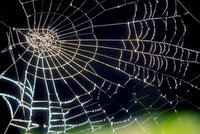 A Fragile Web
A Fragile WebI was told she had fallen twice in a week so I did a home visit in her small rural community to see if anything could be done to decrease her risk of having more falls.
“Hello Sophia,” I said through the dirty telephone receiver in the entrance of the small seniors’ apartment building. “Soph-I-a,” she corrected, emphasizing the long “I”. “Come in.”
I entered her tiny apartment observing her tall, gaunt frame and loose fitting clothing. “How much weight have you lost?” She guessed about 30 or 40 pounds in the past year, “but I am eating well,” she assured me. She has a hot meal delivered to her door five times a week by a volunteer, and I wondered if she ate anything else. She showed me her bruised limbs and the broken china in the cabinet she had fallen against. I did the usual assessment of strength and balance and found both lacking in a severe way.
“Sophia, if you get any weaker, you will not be able to continue living on your own,” I told her. “You are walking a very fine line between independence and dependence. Even with your walker, cane, bathroom aids and bed rail, you are going to fall again if your legs don’t get stronger.”
It turns out that Sophia has one friend in the building who walks with her each day. This friend has been away for two months, and the social isolation and inactivity have depleted her strength.
“Today is my son’s 50th birthday,” she tells me proudly. Her only child has moved 3000 miles away to live with a new girlfriend while still trying to deal with the ruins of his previous relationship.
I return to my car and notice a spider has spun a single thread of a new web between a nearby shrub and my side mirror. As I drive away, the web snaps. Sophia is hanging on to independence by one or two thin threads. The spider will build again, but I doubt Sophia can.
Photo by Ian Britton
The human cycle of life can be sad and pitiful. There are so many we could reach out to if we only new.
ReplyDeleteNo. 1 daughter deals with a number in similar situations.
Some of the elderly I see are too proud to ask for help. On the other hand, people live in crowded neighbourhoods and apartment buildings in social isolation. It is so important to have even one person who cares about you and visits on a regular basis.
ReplyDeleteI work with the elderly and disabled also, but in a much different context. Often it is their families looking for help from our social service agency and finding that there is little there to take the place of a round-the- clock caregiver.
ReplyDeleteParents don't want to ask for help and adult children don't want to be burdened. It is very sad to see and not be able to do more.
Laura, I discovered last night what your main job is. You must be a saint! dealing with social problems at the end of a phone line. Unfortunately, disconnected and dysfunctional families can stumble along until there is a crisis, and then it is very hard for outside agencies to find a quick "fix".
ReplyDelete